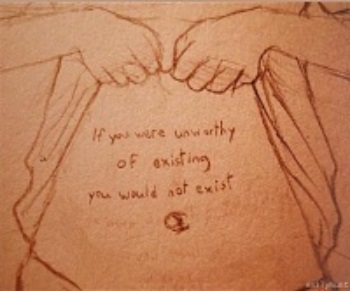School
by Emily
(Ontario Canada)

I think I'm more sensitive to verbal harassment than others because I've always been easily upset by it, and have had a hard time letting go of even the minor insults. I think I may have been traumatized by the incidents that occurred in grade 8 and high school, because I never used to have nightmares about being bullied until then.
I get so angry when I have those dreams. I get so upset and it's just not fair that they see no wrong in the things they've done, the pain and anger they've implanted into my memories. I fear that I will never be able to let this go unless I get back at them somehow, try to confront them in some way, or until they apologize to me.
Everyday when I go to school, I'm worrying about the most pointless things, like being insulted or catching the flu from someone. Sickness and mean people are inevitable so why worry about them? Just try to keep a healthy lifestyle and shrug off the insults right? Yet it is not enough to calm my nerves, or tame my inner beast.
I'm at a loss for how to make my brain shut up and disconnect my thoughts from my over-active amygdala. I've tried meditation and self help books. I've tried counseling and therapy, and I've tried to call a counselor but the receptionist was rude and wouldn't let me make an appointment unless my doctor called them.
I feel like a lost cause, like I'll just keep seething and brooding until my anger manifests into illness and kills me. Man...I have issues.
Response from Dr. DeFoore
Hi Emily
Thanks for submitting your story on this site. You are not a lost cause, by any means--although I realize you feel that way. I will help you here, and I assure you that if you decide to call my office for counseling, Cindy will be very friendly and help you get set up for an appointment. Our phone number is 214-764-7930.
It does indeed seem like you have PTSD. If you have the focus and clarity to do them, the exercises you will find on this page will really help you. Just work with each memory as it comes up.
For example, picture the kids who harrassed you, and you being harrassed. Then imagine yourself as you are today, going into that scene and protecting the younger you. If you can't imagine yourself doing this, or if you feel too afraid or angry to do it, don't worry, that just means there are some other things that need to happen first.
Here's what I want you to do for yourself:
1) Write a detailed account of any abuse, abandonment or neglect you received as a child. Don't hold back or leave anything out. Describe every detail. Write about everything that has ever hurt, frightened or angered you. I know it might take a while, but it will really help. This is for no one's eyes but yours, so don't worry about that. The benefit is how it will help you to revisit these memories from your present position. What's the point of this? There is trauma that occurred before your school trauma, or you would have been able to let it go by now. So, we're dealing with the early trauma first, then moving on to the more recent memories.
2) Now that you have brought up those memories, try the guided imagery processes again. Use these techniques for both the childhood and more recent trauma, and keep trying until you get some relief. They are powerful tools, that work very well if you use them.
When you deal with your past experiences this way, it will make the following techniques work much better for you. So be sure and do the above exercises before moving on to the following ones.
1) Use the journaling processes you will find described on this page to begin managing your emotions more effectively on a daily basis. This will include a journaling process of writing about your past trauma, and then shifting to positive journaling about the good things in yourself, your life and other people. If the anger journaling applies to you, then use that--otherwise, you can skip that part.
2) Moment by moment, day by day, shift your focus from what you don't like to what you do like. The things that trigger your anger are all things you don't like or don't want. Train your mind to look at the things you do want and like. Use this to extend the benefit of the positive journaling process above.
3) If you feel afraid when you imagine yourself standing up to the people who have traumatized you, that just means you need to claim your healthy anger.
Believe in yourself, Emily. You can do this, if you set your mind to it.
If you try these techniques and you're still having the flashbacks, then consider calling for a counseling session. If you can't come in to our offices, we also offer telephone counseling.
Never, ever give up on yourself.
My very best to you,
Dr. DeFoore
P.S. Emily wrote again, and here is her message:
Thank You
I was cleaning out my inbox and I accidentally deleted your response to my story titled "School" about my emotional conflicts related to high school. I read your response, and I truly felt like you understood where I was coming from. For the longest time I have felt like I'm the only one in the world who feels unnecessary guilt and frustration due to lack of control over my anger. I felt like everyone was normal and I was the only one with a broken brain.
One of my favourite tips you suggested for taming my "inner beast" was visualizing a memory in my past that brought up intense anger, and changing the course of events that lead to that negativity. Although I have countless memories that make me angry, I would still like to try it out.
I'm also going to get a referral from my doctor to see a cognitive behavioral therapist. It may not be necessary to go into further investigation about my past. I understand now that everyone carries a field of negative energy through their whole existence, and some just have it worse than others.
I feel optimistic right now. I guess I'm not a hopeless case.
Response from Dr. DeFoore
Hi Emily--thanks for your contribution! I appreciate you taking the time to tell how the site has helped you. If you haven't already done so, be sure and try
these imagery processes for emotional healing. This is more of what you described about visualizing.
All the best to you!
Dr. DeFoore
Join in and write your own page! It's easy to do. How? Simply click here to return to PTSD page.
We receive commissions on Amazon sales on this website.



